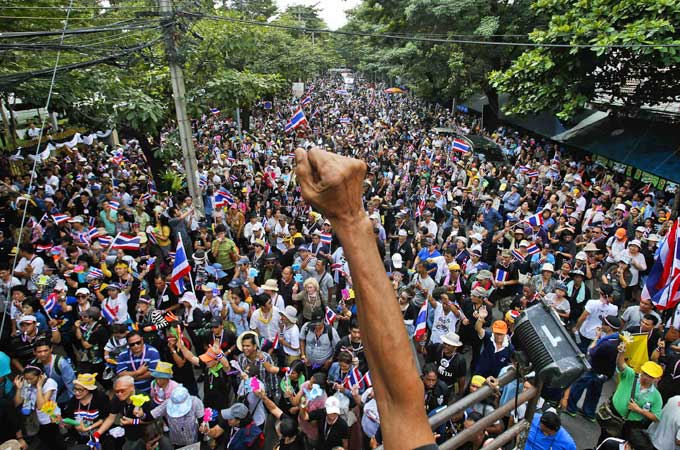Thai PM calls for end to opposition protests
Yingluck issues appeal after easily winning no-confidence vote in parliament as sit-ins at ministry buildings continue.

Anti-government demonstrators plan to march towards the headquarters of Thai Prime Minister Yingluck Shinawatra’s ruling party on Friday, forging ahead with a campaign to overthrow her after rejecting her call for dialogue.
Yingluck breezed through a parliamentary no-confidence vote on Thursday but that failed to pacify protesters who accuse her of abusing her party’s majority to push through laws that strengthen the behind-the-scenes power of self-exiled brother and former premier, Thaksin Shinawatra.
Hours later, on Thursday, she appealed to protesters to end their sit-ins at ministry buildings across the capital, Bangkok.
“I propose to protesters to stop protesting and leave government offices so the civil service can move forward,” she said.
“The government does not want confrontation and is ready to cooperate with everybody to find a solution.”
|
|
| Thailand protests: Then and now |
Demonstrators responded to her call by cutting the power to the country’s national police headquarters, showing that the vote was unlikely to end the biggest anti-government protests since deadly political unrest three years ago.
Police officers have so far been restrained in dealing with the thousands of protesters that have come onto the streets across the city.
The military has also not been deployed, seemingly in a bid to avoid the bloodshed that marked protests in 2010.
“The authorities seem keen to avoid confrontation that could turn violent,” Al Jazeera’s Florence Looi, reporting from Bangkok, said.
Protesters also demonstrated outside the Defence Ministry on Thursday.
The Department of Special Investigation (DSI) was evacuated on Wednesday as about 2,000 protesters gathered outside, rallying against Yingluck and her influential brother and former prime minister Thaksin Shinawatra.
The DSI, located in a complex of key government offices, recently indicted Suthep Thaugsuban, the protest leader, for his alleged role in the deaths of more than 90 people in the 2010 military crackdown targeting supporters of Thaksin.
Divisive personality
Thaksin was deposed in a 2006 military coup and fled the country to avoid a two-year prison term on a corruption conviction.
He continues to sharply divide the nation, with his supporters and opponents battling for power.
Al Jazeera’s Looi said the Chinese ambassador had offered to mediate between the two sides.
“But it is doubtful that protesters will sit down to negotiate – they want the government out,” she said.
 |
| Thousands of opposition supporters have targeted government offices in Bangkok in recent days [Reuters] |
Sean Boonpracong, Thailand’s national security adviser, played down the immediate impact of the protests.
“The business of government is going on as usual,” he told Al Jazeera.
“The prime minister wants the protesters to come in and talk, and we have to be slightly patient. I’m sure the economic impact will be quite substantial if they do not come in to talks.”
Boonpracong said the disruption of key services in the capital was unnecessary, given that elections are due in 2015.
“The protesters could vote us out in two years, and that is the normal way of things,” he said.
“They can take us down … they have to have good policies.”
Boonpracong said the government wanted to arrest the organisers of the demonstrations, but not the masses who were taking part.
Suthep Thaugsuban, the protest leader and a former deputy prime minister, said protesters remained “very upbeat”.
“If we demolish the Thaksin regime … we will set up a people’s council, which will come from people from every sector,” he said.
“Then we will let the people’s council pick good people to be the prime minister and ministers.”